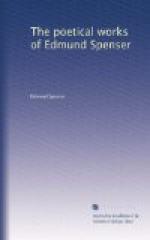Ver 590.—This second series of pageants is applicable exclusively to Sir Philip Sidney. The meaning of the third and fourth is hard to make out; but the third seems to have reference to the collection of the scattered sheets of the Arcadia, and the publication of this work by the Countess of Pembroke, after it had been condemned to destruction by the author. The fourth may indeed signify nothing more than Lady Sidney’s bereavement by her husband’s death; but this interpretation seems too literal for a professed allegory. The sixth obviously alludes to the splendid obsequies to Sidney, performed at the Queen’s expense, and to the competition of the States of Holland for the honor of burying his body. C.
L’ENVOY: L’Envoy was a sort of postscript sent with poetical compositions, and serving either to recommend them to the attention of some particular person, or to enforce what we call the moral of them.— TYRWHITT.
* * * * *
THE TEARES OF THE MUSES.
BY ED. SP.
LONDON:
IMPRINTED FOR WILLIAM PONSONBIE, DWELLING IN PAULES CHURCHYARD AT THE SIGNE OF THE BISHOPS HEAD.
1591.
* * * * *
TO THE RIGHT HONORABLE
THE LADIE STRANGE.
Most brave and noble Ladie, the things that make ye so much honored of the world as ye bee are such as (without my simple lines testimonie) are throughlie knowen to all men; namely, your excellent beautie, your vertuous behavior, and your noble match with that most honourable Lord, the verie paterne of right nobilitie. But the causes for which ye have thus deserved of me to be honoured, (if honour it be at all,) are, both your particular bounties, and also some private bands of affinitie*, which it hath pleased your Ladiship to acknowledge. Of which whenas I found my selfe in no part worthie, I devised this last slender meanes, both to intimate my humble affection to your Ladiship, and also to make the same universallie knowen to the world; that by honouring you they might know me, and by knowing me they might honor you. Vouchsafe, noble Lady, to accept this simple remembrance, though not worthy of your self, yet such as perhaps by good acceptance thereof ye may hereafter cull out a more meet and memorable evidence of your own excellent deserts. So recommending the same to your Ladiships good liking, I humbly take leave.
Your La: humbly ever.
ED. SP.
[Footnote: Lady Strange was Alice Spencer, sixth daughter of Sir John Spencer of Althorpe. C.]
* * * * *
THE TEARES OF THE MUSES.
Rehearse to me, ye sacred Sisters nine,
The golden brood of great Apolloes wit,
Those piteous plaints and sorowfull sad tine
Which late ye powred forth as ye did sit
Beside the silver springs of Helicone,
5
Making your musick of hart-breaking mone!




